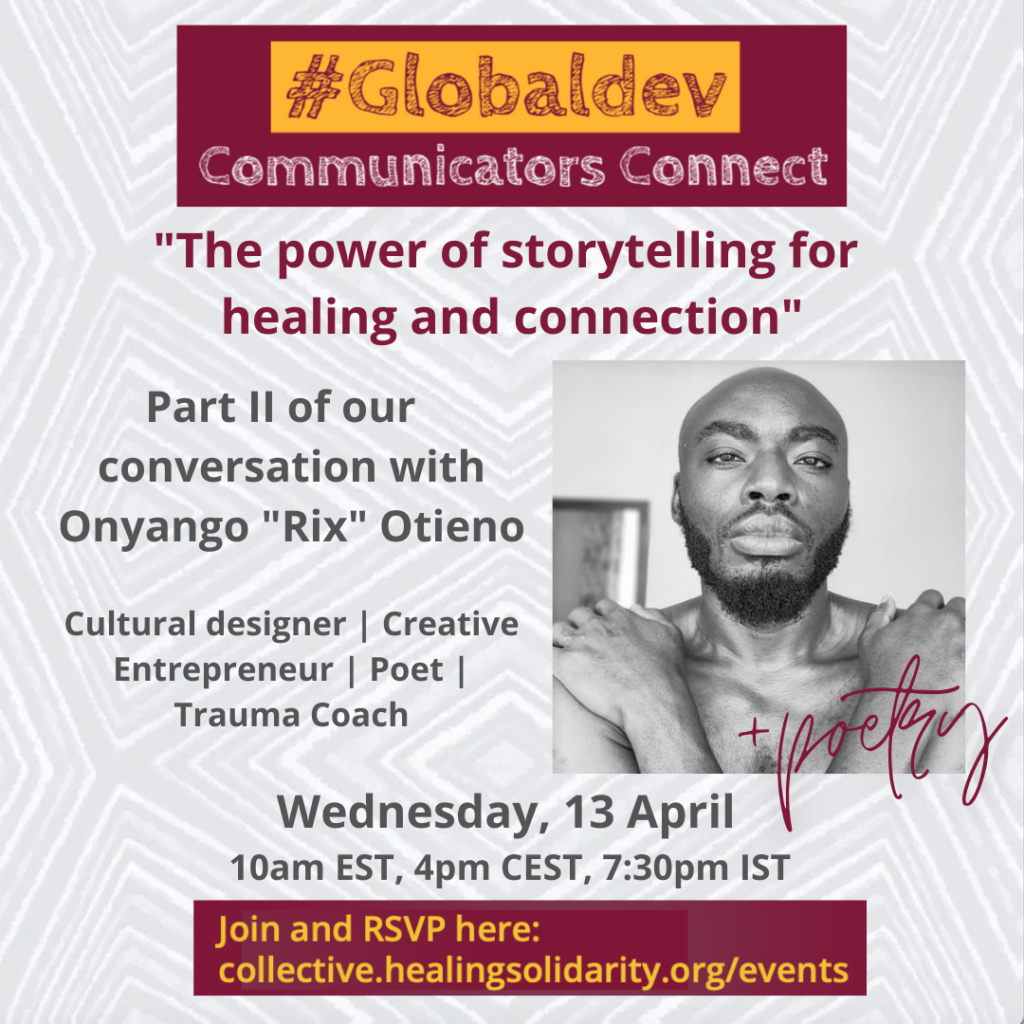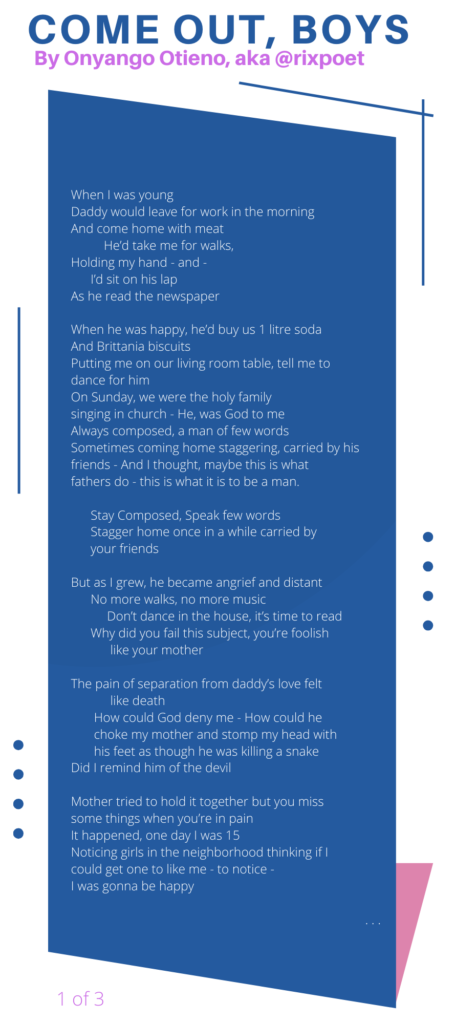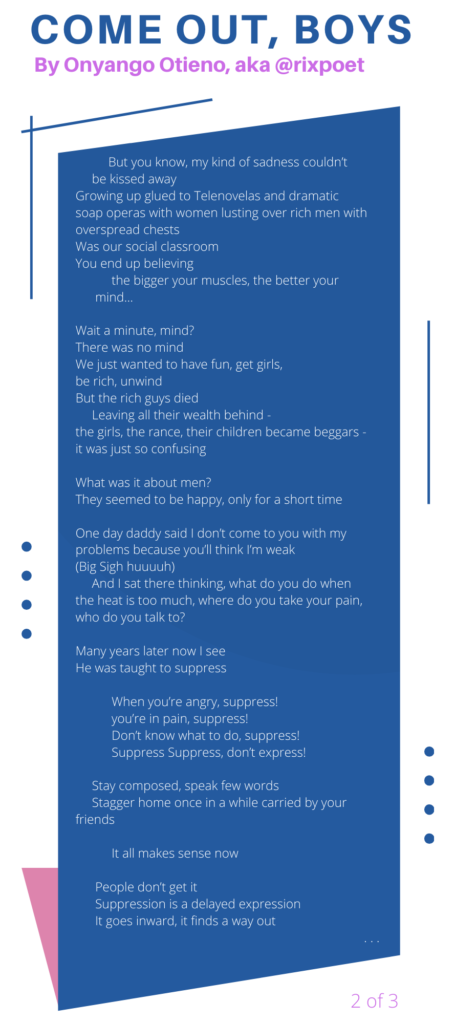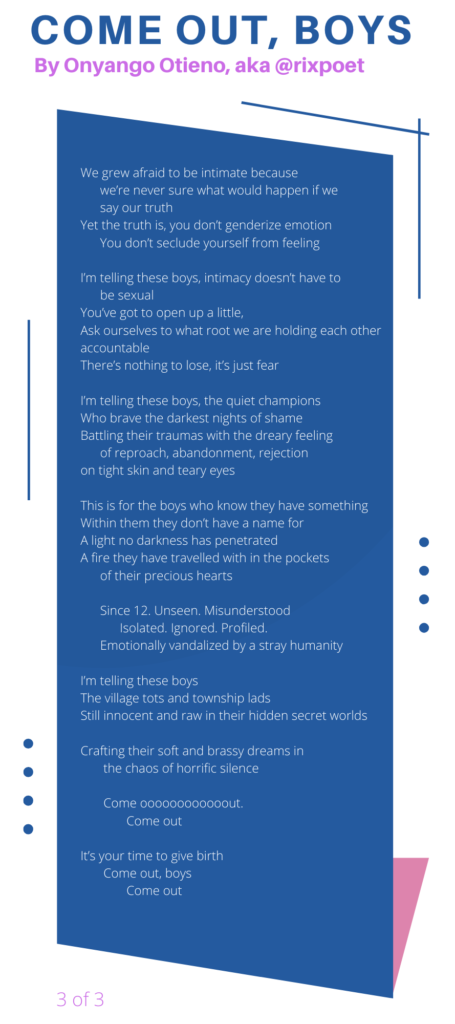
We were so glad and grateful to welcome Onyango Otieno as our special guest in March and April’s #Globaldev Communicators Connect in the Healing Solidarity Collective. Part I of our interview below shows why:
Jennifer Lentfer: Online, you describe yourself as “Cultural designer | Creative Entrepreneur | Poet | Trauma Coach“. Would you want to say more about these descriptors and how they come together in your work?
Onyango Otieno: When it comes to justice, what can we re-design in our approach, and take what has been working to innovate some more?
When it comes to care, what is it around care that has not been working?
We follow the rules all the time, but that has not been inclusive. That we can change. So how can we design that?
When it comes to relationships as well, for many of us, our idea of relationships come from religious background, or we’re learning from Hollywood. But you don’t have any curricula that can teach you how to relate with others – the so called soft skills, which are like basic needs. For the majority of the world, nobody really taught us these things. People coming from Aboriginal societies, or indigenous communities, were actually taught. They were sat down and were taught:
“This is how you talk to people. This is how you ask. This is how you say ‘Thank you’.” Those types of instructions no longer exist.
So for me, it’s a multi faceted idea of designing culture – just sharing my values and energies in developing these things that I care most about. For the most part, that’s people.
This comes out as well in poetry, and in community organizing, and in singing and dancing, and in friendship and connecting people to other people. I really love it when people connect to each other. Because it just encompasses the idea that we need one another to make life work. We need one another.
In Africa, there is an old tool of trade that was called barter trade. This is before currency, like money was introduced to us. So guys would meet at the market. If I have beans, and Jennifer has rice, and I need rice, and Jennifer needs beans, we exchange. We weigh what you need, and what I need. Then somebody else has tomatoes, and they come with that, and we exchange. It was very human centered.
I would love to imagine that kind of a world where we are not only trading goods, but also gifts and emotions – where the strong people can support the weak people, structurally even. How can we share stories as a result to lift people up? How can we share food to lift people up? How can we share space to lift each other up?
I’m very passionate about those things because for me there’s a line that came to me today:
All the dreams you have are already true because you are living in them.
Even before they come out to the world, they are true inside you. That is the world I live in. I live in a world where people see one another, they trust one another, they respect one another, they forgive one another. They support one another.
Jennifer Lentfer: This keeping dreams alive thing is so important. I don’t remember where I read it once but they said something like, “the artist is the child who survived.” This harkens back to not only our own childhoods, but generations past. Speaking of childhood, I was wondering if you would read “Come out, boys” to us.



Onyango Otieno: When I was young, the way I saw my parents fighting, I could realize that they were just not communicating. That’s why I said when I grew up, I wanted to be good at this. I want to be good at language. I wanted to be good at communicating myself. And I spent years and years just wanting to know words and words to my own language so that I could express it to the world.
I felt with all the misunderstanding I had already experienced, there is no way I was going to die without being heard. So I learned it. I learned the language, and I looked for it, and I searched it and I searched it. And bit by bit, it formed – in between time – it formed and formed and formed. I can say I am somewhere with it. Still growing in its own respect, but I am somewhere with it. And so that’s a prospect of what’s to come.
Jennifer Lentfer: There was a moment when I also realized this nature/nurture is what made me a communicator. So part of it was the gifts and part of it was exactly what you’re saying: I need all of us to be heard.
***
You can listen to a recording of Onyango’s March #Globaldev Communicators Connect conversation with Joan Okitoi-Heisig in the Healing Solidarity Collective here.
#GlobalDev Communicators Connect is a monthly meeting created and hosted by Joan Okitoi-Heisig and myself in the Healing Solidarity Collective to support people responsible for external communications in international aid and philanthropy to connect to each other.
On the second Wednesday of each month, we gather to learn from other communicators in the sector, ignite our creativity, and reflect on where/when we personally might be able to take more “risks” to invite change in how our organizations communicate about our work. We dare to invite the uneasy conversations and get inspired by each other.
***
Related Posts
The cost of diversity without inclusion
5 pulse-checks before clicking ‘publish’ on #globaldev communications
Exploring the tension between theory and practice in community development
Leading From Love: The attentiveness that brought accountability

